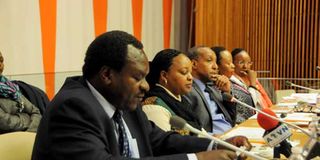Kenya gains recognition in New York for women empowerment

Devolution CS Anne Waiguru (2nd left) and other panellists during a side event hosted by the Ministry of Devolution and Planning on the sidelines of the 59th session of the Commission on the Status of Women at the UN Headquarters, Wednesday March 18, 2015. Kenya was praised for its policy of promoting the welfare of women in the public sector. PHOTO | COURTESY
What you need to know:
- Among the delegates who spoke and praised the "transformative programme'' was the UN Under-Secretary-General and the Executive Director of UN Women Phumzile Mlambo-Ngcuka.
- She asked other countries to emulate Kenya's example and praised President Uhuru Kenyatta for his "commitment and leadership'' to women's advancement and gender equality.
- The UN Women boss described the project as "a great initiative'' to fight the "cycle of poverty'' among women and said it was a direct challenge to organisations such as hers.
- Ms Waiguru, in responding to comments by the participants, said Kenya was ready to share its experience on the initiative with other governments.
NEW YORK
Kenya's affirmative action policy to guarantee women, youth and the disabled access to supply goods and services to the government was roundly applauded here as a first and a unique example to advance the economic status of women.
Delegates who attended a panel discussion on accessing business opportunities for women, youth and the disabled praised the 30 per cent affirmative action procurement regulations for the special group and urged other countries, especially from Africa, to follow Kenya's lead.
Those who spoke at the event hosted by the Ministry of Devolution and Planning on the sidelines of the 59th session of the Commission on the Status of Women at the UN Headquarters in New York, said they were impressed that the government was able to set aside billions for the programme to advance women economically.
Among the delegates who spoke and praised the "transformative programme'' was the UN Under-Secretary-General and the Executive Director of UN Women Phumzile Mlambo-Ngcuka.
EMULATE KENYA'S EXAMPLE
The Under Secretary-General of the United Nations also asked other countries to emulate Kenya's example and praised President Uhuru Kenyatta for his "commitment and leadership'' to women's advancement and gender equality.
"This is truly transformational and an example of what a gender responsive budget that we always talk about can do,'' Ms Mlambo-Ngcuka said after the presentations by Ms Waiguru and four other panellists from Kenya.
The UN Women boss described the project as "a great initiative'' to fight the "cycle of poverty'' among women and said it was a direct challenge to organisations such as hers, in supporting such programmes.
"Kenya has shown that transformation can be done with nice men who are involved in decision making coming together to change the lives of women. The fact that the government did not go out of its way to look for money (for the programme) kills the argument that there is no money for gender equality,'' she said.
She was responding to Ms Waiguru's presentation in which she revealed that the government has committed $2.1 billion every year for the 30 per cent procurement reservation from a total of $6.3 billion public procurement annually.
REPLICATE RULE IN PRIVATE SECTOR
The other panellists included Ms Gloria Ndekei, the director of gender at the Kenya Private Sector Alliance (Kepsa) who said that Kepsa would replicate the 30 per cent procurement rule in the private sector.
Others were Mr Maurice Juma, the Director General of Public Procurement and Oversight Authority, Ms Jane Kiragu, a board member of Kenya Women Business Owners Association and Ms Cecily Mbarire, the chairperson of Kenya Women Parliamentarians Association.
Mr Macharia Kamau, Kenya's Permanent Representative to the United Nations, also gave his remarks and introduced the panel.
In her address, Ms Waiguru took the delegates through the government’s “transformative'' initiatives saying they were undertaken to ensure gender equality and economic advancement of women.
"What the government is doing in essence is putting real money in women’s hands.
“In doing so, the government is closing the loop in the economic empowerment cycle by providing women access to the biggest consumer in the Kenyan market – that is government,'' she told the meeting.
The Commonwealth Women Business Network's Executive Director Arif Zaman described the affirmative action on public business procurement as a powerful example that would drive change.
His organisation has announced it will set up a Commonwealth women's business academy in Nairobi to train women in procurement.
Namibia's director for gender said: "We are very proud of Kenya. It has done Africa proud. This is one step forward in making Africa the tree of life.''
Ms Waiguru, in responding to comments by the participants, said Kenya was ready to share its experience on the initiative with other governments.




